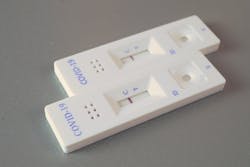Lateral flow tests detect most people at risk of transmitting COVID-19
Researchers have used a new formula to show that lateral flow tests (LFTs) are likely more than 80% effective at detecting any level of Covid-19 infection and likely more than 90% effective at detecting those who are most infectious, according to a news release from University College London.
This level of accuracy is much higher than some previous studies have suggested, and the authors say the tests are a reliable public health tool in stopping the spread of the virus.
In a report in Clinical Epidemiology, the researchers from UCL, Liverpool University, Harvard University and the University of Bath highlight that LFTs work in a very different way to polymerase chain reaction (PCR) tests and cannot be compared ‘like for like.’ LFTs detect material from the surface proteins of the virus and are very likely to give a positive result when someone is infectious, but PCR tests detect the virus’ genetic material, which can be present for weeks after a person is no longer infectious.
Lead Author Irene Petersen, Professor of at UCL’s Institute of Epidemiology and Health Care, explained, “Previous studies comparing the reliability of lateral flow tests and PCR tests could be potentially misleading because a PCR test is a marker of having been infected at some point within a certain window of time and does not necessarily mean someone is infectious when testing positive.
“In most validation studies, individuals were tested simultaneously with LFTs and PCR tests, with PCRs being used as a gold standard to say someone is ‘positive or negative’. The sensitivity of the LFTs was therefore evaluated by their ability to identify the same cases that the PCRs picked up. However, this is like comparing apples and oranges.”
The paper presents a formula for calibrating the sensitivity of LFTs and gives an illustrative example from a study in Liverpool. In the Liverpool study, a head-to-head validation suggested the sensitivity of LFT was only 40%. However, after taking into account the differences between the tests and the biology of Covid-19 the UCL-led team suggests that, in reality, the sensitivity of the typical LFT in being able to identity someone who is likely to be infectious, is above 80%.
The authors acknowledge that the sensitivity of the LFTs is, of course, dependent on sampling errors and experience of the person performing the sampling and the test and that these uncertainties are not taken into account in their formula calibrations.

